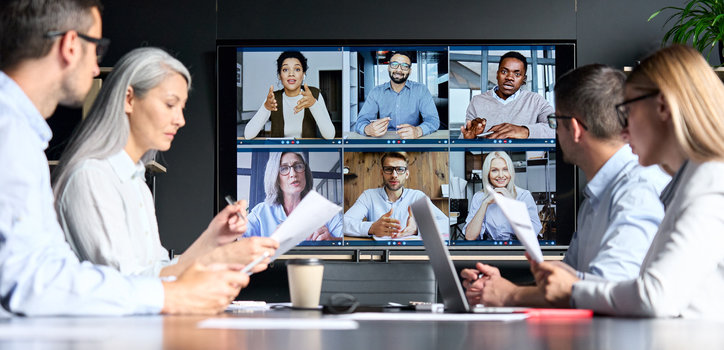Hybrid work models have a lot to offer – reduced business expenses, the ability to hire talent from anywhere, and a more flexible work environment. But there are employee challenges that come with a virtual work style, which is why having a solid digital employee experience strategy is so important.
Worker surveys show that remote employees have trouble with everything from managing work-life balance to exhaustion. A digital employee experience strategy can resolve these problems, prevent burnout, and ensure your teams view your digital work culture as supportive and positive rather than draining or toxic.
Let’s look at what digital employee experience is, why it matters, and what strategies and software your organization can use to achieve a better experience for your remote and hybrid teams.
What Is Digital Employee Experience?
Digital employee experience – or DEX – is the way your employees feel about and perceive the experience of working for your company as part of a work-from-wherever team. As Forrester analysts Andrew Hewitt and Cheryl McKinnon explain, DEX encompasses the interactions employees have with your company’s technologies, processes, and policy choices.
How easy it is to communicate with co-workers. Company rules surrounding time tracking and work hours. The frequency and length of virtual meetings. Digital company culture. All of these concepts fall within DEX.
So, as you look at what you can do to create a digital employee experience strategy, explore ways to improve these issues through the types of software and processes you have in place.
Why Is DEX Important?
Remote work is here to stay, and the majority of workers – 64 percent of the global workforce according to a 2022 survey – would consider looking for a new full-time job if their employer expected them to return to the office full-time.
But that doesn’t mean everything’s perfect. Being a digital employee, whether as a remote or hybrid worker, is different than working in an office full-time.
For many, home doubles as the workplace, and the line between work-life and family or personal time gets blurry. Other issues are loneliness, a lack of transparency, or simply confusion and wasted time. There might not be clear processes in place for every aspect of daily work, or the platforms being used aren’t sufficient to create seamless experiences.
By focusing on digital employee experience and implementing a strategy, companies can improve the digital workday for employees. And, just as with excellent customer experience, with excellent DEX, employees are more likely to be engaged, loyal, and to stick with your company – which can lead to better productivity, reduced security risks, and more streamlined workflows for everyone.
Strategies and Software Solutions to Improve the Digital Employee Experience
Mastering DEX takes planning and collaboration across departments, including HR and IT. But there are a few steps your organization can take now to improve the employee experience for your remote or hybrid teams.
1. Set Up Clear Communication Channels
Do your employees know who to reach out to when they have an issue? Is there a feedback loop in place through employee surveys, small group meetings, or manager oversight to identify problems with the digital company culture?
To ensure your people are thriving, set up a process for gathering honest feedback and interacting with employees on an individual level so you can identify and resolve issues right away. Also, set up a channel for suggestions – your employees can provide insightful ideas that help improve digital processes.
2. Follow Digital Etiquette Best Practices
With a huge rise in remote work over the past couple of years, a few digital etiquette best practices have emerged. Implementing these rules can help to prevent burnout and enable your teams to feel supported at work.
- Be mindful of employees’ time. Make sure managers aren’t setting up individuals that don’t do customer-facing work with excessive online meetings. This can be draining for employees that need blocks of time for focused work. Also, don’t force people into the office for the sake of it. If a meeting or task can happen virtually, give people the option.
- Make mental health a priority. Humans are social creatures, and no amount of technological innovation or workplace change will alter that fact. With digital teams, people experience less human interaction, which can lead to feelings of loneliness. To combat this, business leaders and managers can find ways to prioritize mental health, such as setting up a channel for reaching out about issues and encouraging healthy habits, such as exercise, sleeping well, spending time in nature, and taking time for oneself.
- Empower your workers to set healthy boundaries. There are different strategies you can use to make sure everyone has clear boundaries and work isn’t bleeding over into life. Use software that has an indicator function so co-workers know when someone is available or not. Technology can also be used to set reminders for your employees to take regular breaks. It’s also important for business owners and managers to set a good example – for instance, if you’re working late at night and answering calls on the weekend, your staff might follow suit.
3. Use a Communications Platform Designed for Hybrid Work
Another key part of the digital employee experience is software. And the most important DEX platform is communications.
For the best experience, your teams need a tool that lets them access all the important communication channels from one place and is easy to use. Ideally, your software helps them save time and simplifies workflows. It should include high-quality video conferencing, chat, file sharing, and more – and it should integrate with other business tools for better data visibility.
Start Improving DEX Today with Intermedia Unite
Intermedia Unite offers all the features and functionality you need to boost DEX. It’s a cloud-based solution that comes with industry-leading security, support, and reliability. Learn more today.
September 6, 2022
Explore other posts on these topics: Unified Communications

